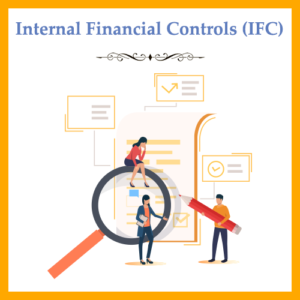Internal Finance Control (IFC) is the cornerstone of financial integrity and accountability within organizations. It encompasses a comprehensive framework of policies, procedures, and processes designed to safeguard assets, ensure accuracy in financial reporting, and mitigate risks of fraud and error.
At its core, IFC aims to provide assurance to stakeholders, including management, shareholders, and regulatory bodies, that financial operations are conducted in a transparent, ethical, and compliant manner. By establishing effective controls, organizations can minimize the likelihood of financial mismanagement, unauthorized transactions, and other irregularities that could jeopardize their financial health and reputation.

- Key components of Internal Finance Control include:
1.Segregation of Duties:
Segregating duties among different individuals or departments helps prevent conflicts of interest and reduces the risk of fraud. By dividing responsibilities for financial transactions, such as authorization, recording, and custody of assets, organizations can create checks and balances that enhance accountability and transparency.
2.Authorization and Approval Processes:
Clearly defined procedures for approving financial transactions, expenditures, and investments ensure that funds are allocated appropriately and in accordance with established policies and budgets. Authorization levels should be established based on the hierarchical structure of the organization, with appropriate oversight and review mechanisms in place.
3.Documentation and Recordkeeping:
Accurate and comprehensive documentation of financial transactions, including invoices, receipts, contracts, and other supporting documents, is essential for maintaining transparency and accountability. Proper recordkeeping practices facilitate auditing, reconciliation, and monitoring of financial activities, enabling timely identification of discrepancies or irregularities.
4.Internal Audits and Reviews:
Regular internal audits and reviews provide independent assessments of financial controls and processes, identifying areas of weakness or non-compliance and recommending corrective actions. Internal audit functions play a critical role in evaluating the effectiveness of IFC measures, ensuring compliance with regulatory requirements, and driving continuous improvement.
5.Risk Assessment and Management:
Proactive identification and assessment of financial risks, including fraud, errors, and operational inefficiencies, enable organizations to implement appropriate control measures to mitigate these risks. Risk management practices should be integrated into the overall governance framework, with ongoing monitoring and evaluation to adapt to changing circumstances.
6.Training and Awareness:
Building a culture of financial responsibility and compliance requires ongoing training and awareness programs for employees at all levels of the organization. Training should cover relevant policies, procedures, and ethical standards, emphasizing the importance of adherence to IFC principles in day-to-day operations.
7.Technology and Automation:
Leveraging technology and automation tools can enhance the effectiveness and efficiency of IFC processes, reducing manual errors and streamlining workflows. Software solutions for financial management, reporting, and monitoring enable real-time visibility into financial activities and facilitate data analysis for informed decision-making.
In conclusion, Internal Finance Control (IFC) is essential for promoting financial integrity, transparency, and accountability within organizations. By implementing robust control measures and adopting a proactive approach to risk management, organizations can safeguard their financial resources, uphold regulatory compliance, and maintain stakeholder trust and confidence in their financial reporting and operations.